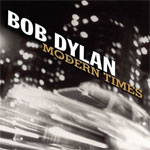A 65 year old enigma

Modern Times - 2006
In his mid sixties, Bob Dylan continues his streak of raspy-voiced blues with Modern Times, an album of determined cynicism trademarked by his simple, minimalist folk style. His greatest strengths, modesty and melancholy, recall feelings of an old man regaling stories of his youth to his grandchildren. Modern Times is haunting yet sincere, and will surely be appreciated by adoring fans for its wise lyrics and poetic charm.
“Everybody got to wonder what's the matter with this cruel world today,” Dylan croons on the first track, “Thunder On The Mountain.” The song is a harsh scrutiny of contemporary culture—he condemns army recruitment, the pettiness of religion, and even Alicia Keys, presumably on behalf of all modern music. Dylan has recently slammed it all, claiming, “I don't know anybody who's made a record that sounds decent in the past 20 years,” perhaps implying that—much like how Alicia Keys can't keep him from “cryin’”—modern music is opposite from his own minimalist philosophy.
These officious judgments come off as more abrasive than ever. “The world has gone black before my eyes,” he solemnly moans on the love ballad “Nettie Moore," and it is this bitterness that taints the album with an overly critical image. Contrary to his uplifting protest songs from the 60’s and 70’s, which at least had some positive undertones, Modern Times is downright depressing. It doesn’t help that Dylan sounds like he could die at any moment, though it certainly does amplify the gloomy atmosphere, especially on the final ominous track, “Ain’t Talkin’”: “They will jump on your misfortune when you’re down/ Ain’t no alters on this long and lonesome road.”
However, for most of the songs, Dylan waxes reflective on lost loves and the merit of experience. It is, in this sense, an empowering album; although there have been times of despair and loss, and modern society can be cruel and selfish, life is still worth living. “Come sit down on my knee/ You are dearer to me than myself/ As you yourself can see,” Dylan admits in “Workingman’s Blues #2”, a beautifully humble track and one of the purer gems on the album.
Dylan is a timeless poet, and few have captured the spirit of melancholy so accurately. He admirably continues to create fresh perspectives on life and love through his surreal, occasionally nightmarish lyrics and simple riffs. If it wasn’t apparent earlier, it’s surely apparent now—Bob Dylan is among the greatest lyricists of our time and his talent has not diminished over the years.